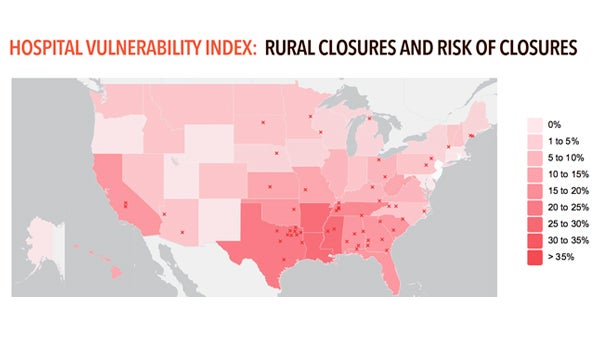Save Rural Hospitals Act hits home
Published 6:19 pm Friday, July 31, 2015

NATIONAL RURAL HOSPITAL ASSOCIATION
ON THE DECLINE: The closure of rural hospitals is escalating, with 55 having closed since 2010. This map tracks those closures and the other 283 hospitals in danger of closing. Belhaven’s hospital is represented on the map.
A bill was introduced last week in the U.S. House that has a particular resonance with many Beaufort County residents.
The Save Rural Hospitals Act is bipartisan legislation introduced by Rep. Sam Graves (R-Mo.) and Rep. Dave Loebsack (D-Iowa), addressing the plight of rural hospitals. Since 2010, 55 rural hospitals have closed across the U.S. and another 283 are on the brink of doing the same. Locally, eastern Beaufort County and Hyde County residents experienced exactly that when Vidant Pungo Hospital in Belhaven closed its doors in July 2014.
Save Rural Hospitals Act would essentially reverse the financial burdens placed on rural hospitals through Medicare sequestration and the Affordable Care Act.
“It stops so many of the cuts that (rural) hospitals have incurred the last few years,” said Maggie Elehwany, vice president of government affairs and policy for the National Rural Health Association.
According to the NRHA, 97 percent of rural counties in the U.S. have a shortage of primary care health professionals, so residents rely on their local hospitals for primary care. Once they close, rural patients have no option but to seek specialty care through larger medical facilities — actually more of a burden on the Medicare system and taxpayers, as primary care is reimbursed at a higher rate than specialty care, Elehwany said.
She said patients in Belhaven are like patients in rural communities everywhere: they tend to be older, poorer and have a higher incidence of chronic disease. Forcing them to travel for health care and pay higher specialty rates puts a financial burden on those who can least afford it.
“It makes sense to keep these rural facilities open,” Elehwany said.
According to Belhaven Mayor Adam O’Neal, the Save Rural Hospitals Act is all-encompassing, addressing all the different items that work against rural hospitals, including the reductions in reimbursement rates.
“One of the main things is that it gives more latitude for communities to establish the health care they need,” O’Neal said.
O’Neal has worked since Vidant Pungo’s closure to reopen the town’s hospital under new management as Pungo Medical Center. In June, he orchestrated a walk from Belhaven to Washington, D.C., gathering a team of walkers from 22 different states. The 283-mile walk — with each mile representing one of the 283 rural American hospitals in danger of closing — ended with a rally for rural health care on the lawn of the U.S. Capitol on June 15.
“Everything from college students to hospital CEOs participated in the walk. It was a really broad spectrum of people,” O’Neal said. “Everybody was passionate for rural health care.”
According to Lindsay Corey, director of communications and marketing for NRHA, O’Neal’s walk generated publicity and increased awareness about rural health care.
“He’s been a great advocate for the issue,” Corey said.
Advocates are hoping for a bill similar to Save Rural Hospitals Act to be introduced in the U.S. Senate, but for now are pleased the conversation has been started in the House.
“We’re very excited about this legislation. For a couple of years now, we’ve been trying to figure out the future model of rural health care, and studying it. What we see is the rate of closure is really escalating,” Elehwany said. “We have to be working to figure out why and ask Congress for a legislative solution.”





